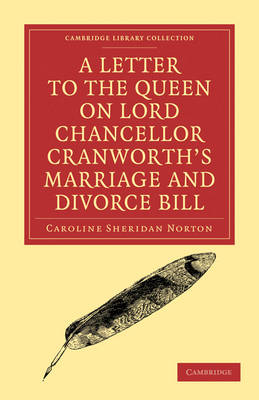Cambridge Library Collection - British and Irish History, 19th Century
2 total works
A Letter to the Queen on Lord Chancellor Cranworth's Marriage and Divorce Bill
by Caroline Sheridan Norton
Published 16 May 2009
Caroline Norton (1808-1877) was a Victorian author and campaigner for social reform, especially reform of women's legal rights. In this lucidly written account Norton describes how upon marriage in 1855 women became legally 'non-existent': they could not bring cases to court; they could not enter into a contract; they could not instigate a divorce and their possessions, earnings and any bequests made to them automatically became their husband's property. Norton explains how this lack of legal autonomy affected women if they became estranged from their husbands, using her own experiences for illustration and recommending changes which would improve women's legal position. Published in 1855 when Parliament was debating the subject of divorce reform, this volume shows the legal position of women at this time. It provides the opinions of contemporary legislators in support and opposition on the issues of women's legal rights and reform of divorce laws.
Caroline Norton (1808-77), author and law reform campaigner, was the granddaughter of the playwright Sheridan and soprano Elizabeth Linley. Her disastrous, violent marriage in 1827 to the financially irresponsible Tory MP and barrister George Norton led her to seek escape in writing poetry. Anonymous autobiographical novels followed, exploring women's powerlessness in marriage, together with regular contributions to periodicals such as Macmillan's Magazine. Flamboyant, intelligent and temperamental, she secured her place in literary society, numbering Disraeli and Dickens among her friends. Ever jealous, her husband accused her of adultery with Lord Melbourne, but the case was unproven. In revenge, he refused his wife access to their sons, and it was this act which led to her determined campaign to improve the rights of women in marriage and divorce. This work, first published anonymously in 1837, was instrumental in the subsequent passing of the Custody of Infants Act (1839).

